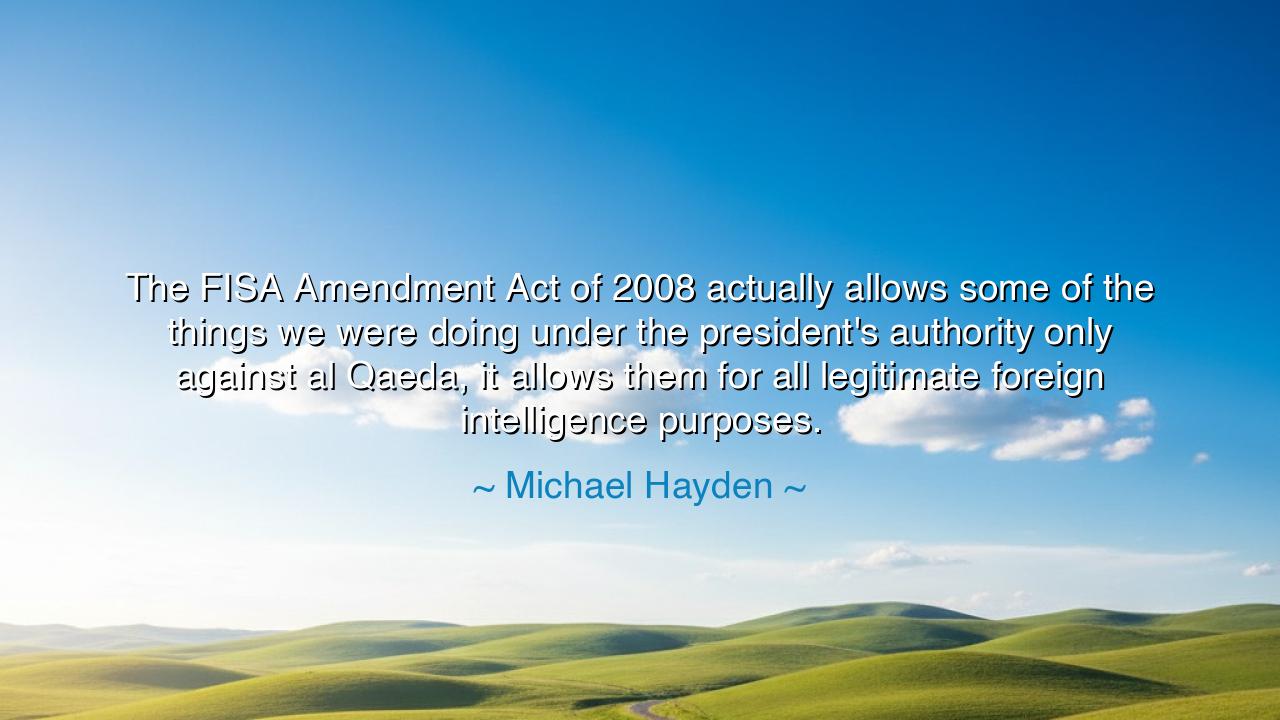
The FISA Amendment Act of 2008 actually allows some of the things
The FISA Amendment Act of 2008 actually allows some of the things we were doing under the president's authority only against al Qaeda, it allows them for all legitimate foreign intelligence purposes.






In the words of Michael Hayden, "The FISA Amendment Act of 2008 actually allows some of the things we were doing under the president's authority only against al Qaeda, it allows them for all legitimate foreign intelligence purposes," we are invited to reflect on the complex relationship between security, liberty, and the powers of the state. The FISA Amendment Act allowed for an expansion of surveillance and intelligence-gathering powers, raising critical questions about the boundaries of state authority and the preservation of civil liberties. Hayden’s quote points to the delicate balance between ensuring the nation’s security from external threats, such as terrorism, while also safeguarding the rights and freedoms that define the very fabric of a democratic society. His statement serves as both a clarification of legal authority and a call for deep reflection on the cost of security and the scope of governmental reach.
The ancients understood well the tension between security and freedom. In Plato’s Republic, the philosopher Socrates debates the role of the state in protecting its citizens. The ideal city, according to Plato, requires laws and governance that promote justice and the common good. However, Socrates also warned of the dangers of unchecked authority, especially when it comes to the state’s power to control its citizens' lives. The balance he sought was one in which the state’s power would serve the people, rather than overpower them. Hayden’s words, set in the context of modern surveillance and intelligence, echo this ancient tension: how do we ensure protection without surrendering our rights? The FISA Amendment Act, much like the laws of old, seeks to address this question, but it leaves us asking: how much security is worth the sacrifice of freedom?
Consider the example of the Roman Empire, which, at its height, sought to protect itself through an ever-expanding military and a vast network of intelligence. Julius Caesar, in his campaigns, used spies and informants to stay one step ahead of his enemies. The Roman generals recognized the value of intelligence in ensuring the stability of the empire, much as modern leaders use it to prevent threats. However, Caesar’s expansion of Roman power also brought consequences, as the Republic transitioned into imperial rule, where the people’s freedoms were often sacrificed for the sake of maintaining control. This historical example reminds us that the growth of state power for the sake of security can come at the cost of the very freedoms it seeks to protect, a paradox that we see echoed in the modern era with Hayden’s description of the FISA Amendment Act.
The FISA Amendment Act represents a legal framework through which the government gains the authority to monitor foreign intelligence—a necessity in an increasingly interconnected world where threats often emerge from beyond national borders. However, Hayden’s statement also reflects the moral dilemma of expanding governmental powers. The act allows for the surveillance of foreign communications, but what happens when the boundaries between foreign and domestic blur? The NSA’s surveillance programs, which became publicly known in the aftermath of the Patriot Act, raised concerns about the privacy of U.S. citizens. While the government’s intent was to ensure the security of its citizens, the public’s trust in the government’s ability to act without overreach was eroded. This historical moment challenges us to reflect on the proper balance between surveillance for the greater good and the preservation of individual freedoms.
The lesson from Hayden’s quote and the historical parallels is clear: the expansion of state power, particularly in the realm of intelligence and surveillance, is not without its risks. It is not enough to merely act in the name of security; we must also remain vigilant about the costs to our freedoms. Like the Romans, who had to weigh the security of their empire against the rights of their citizens, modern democracies must continually ask whether the means of ensuring security are justified by the ends they achieve. This requires constant reflection and dialogue between the state and the people to ensure that trust is maintained, and that governmental power is used wisely and justly.
In our own lives, the message is a call to balance the need for safety with the preservation of liberty. We must remain aware of how power, when left unchecked, can encroach upon the freedoms we hold dear. As citizens of a democracy, it is our responsibility to ensure that our leaders uphold the values of freedom and privacy, even in times of crisis. This is not just a matter of governmental policy; it is about our own participation in the ongoing dialogue about the role of surveillance, privacy, and security in our lives. Just as the ancients questioned the concentration of power, we must question how our society handles the delicate balance between safety and freedom in the modern age.
Therefore, let us heed the wisdom of history and the cautionary tales of past civilizations. While we must protect ourselves from external threats, we must also be vigilant in protecting the rights and freedoms that define us as individuals and as a society. Let us approach the growth of intelligence capabilities with awareness, ensuring that we are not swayed by fear but are guided by principles of justice and respect for the individual. Just as Socrates and Cicero warned against the dangers of unchecked power, so too must we remain committed to preserving the freedoms that make us whole, even in the face of ever-evolving threats. The balance between security and freedom is delicate, but it is a balance that we must strive to maintain.






AAdministratorAdministrator
Welcome, honored guests. Please leave a comment, we will respond soon